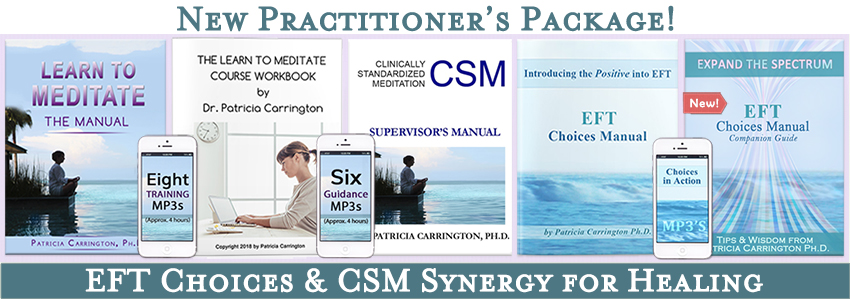How to Find Your Limiting Beliefs with Just One Word
by Andy Hunt
Reprinted from the Practical Wellbeing website, with permission, and featured in www.eftfree.net.
NOTE: Andy Hunt is an EFT & NLP Trainer and Practitioner living in the North East of England. He works with people who give themselves a hard time and get in their own way. He is the author of the book Getting Out Of Your Own Way – Finding and Releasing Unconscious Blocks with EFT. You can visit him online at www.practicalwellbeing.co.uk
(Comments by P. Carrington are in parenthesis)
****************************************
Limiting Beliefs
Our limiting beliefs are a problem, not because they are hard to change, but because they are hard to find.
There are many ways to neutralize limiting beliefs quickly and easily with EFT. Unfortunately, our limiting beliefs are often unconscious and unquestioned, a part of the fabric of our perceptions, which makes them hard to find. Other people’s limiting beliefs can be easy to spot because we are on the outside looking in, but our own remain hidden. That’s why there will always be work for good therapists and coaches.
But what are we going to do if there isn’t a therapist or coach available? Are we doomed to wander ignorant of our own limiting beliefs because we can’t see them?
Fortunately, there is a simple way to bring lots of limiting beliefs into consciousness using just one word. It’s a simple word, readily available and deeply familiar: “Because…”
Because…
Because is a special word because when it appears in a sentence it is usually followed by a reason:
I can’t go out tonight because I am washing my hair
I can’t start a new business now because the economy is on its knees.
I can’t change jobs because I am too old.
Each time you hear because… you are going to hear a reason for the statement that comes just before it. We can use the power of because to bring our “reasons” out into the open.
Facts vs. Beliefs
Before describing how to use because for this, it is worth acknowledging that there are two kinds of reasons that could be uncovered:
Facts are descriptions of reality: I am cold because the temperature is below freezing. The statement The temperature is below freezing is a description of the environment. People are often cold if the temperature drops way below freezing. That’s not a limiting belief, rather is a result of our external reality.
Beliefs are descriptions of our ideas about external reality. These are often confused with facts: “I am alone because nobody wants me.” Nobody wants me is not a description of objective reality (even though it may be confused with one). It is a belief or an idea about reality.
The word nobody is a give away. There are more than 6,000,000,000 people on the planet (that’s a lot). It is impossible to know whether one of those six billion people would be interested in them. In a whole lifetime it would not be possible to meet even a tiny fraction of those people to find out. Nevertheless, for this person it may be a convincing idea about reality.
3-Step Process
Is It A Fact or A Belief? Sometimes, it can be difficult to decide if a reason is a fact or a belief. Fortunately there is a simple test: Treat it as a belief and work with it. If it is a fact it probably won’t change, if it is a belief it probably will. So how can we use “because” to expose our limiting beliefs?
This is a three step process:
1. Choose A Problem
If you are going to uncover limiting beliefs you need a predicament to work with. If limiting beliefs cause difficulties for us which difficulty are we going to investigate?
I can’t start a new business
I am alone
I can’t make enough money
Our relationship is struggling
So what is going on in your world that you suspect may be a result of limiting beliefs?
2. Harvest All The Possible Reasons
Write down a sentence that briefly describes the problem followed by the word “because”, as in:
I can’t start a new business because…
I am alone because…
I can’t make enough money because…
My relationship is struggling because…
[other problem ] because…
Now say your “because”… sentence out loud, then write down whatever comes into your head that completes the sentence. Write as fast as you can and without judgement.
Say the “because”… sentence again and write down whatever comes into your head this time as fast as you can and without judgements or second-guessing.
Repeat this process as many times as you can, until you run out of sentences, either because you have the feeling that the well has run dry, or you find you are repeating yourself.
Important: It is essential that you put your judging mind to the side for this process. The aim here is to get as many reasons as possible, so don’t evaluate your reasons at this point. Go as quickly as you can and jot down whatever comes to mind “right off the top of your head”– this allows the information to float up from your unconscious without being blocked by the analytical mind.
3. Pick the Wheat From the Chaff
Now we have a list of reasons we can sort through at our leisure and identify which of the reasons are limiting beliefs and which are just the random chatter of the mind.
Work through your list of “because” sentences, saying each out loud.
Give the reason a truth score from 0-10 where 0 is false and 10 is true (this is how true it feels, not how true it is logically). Repeat this process for each of the reasons until you have a list of reasons that have some emotional charge.
(P. C. Comment: You may want to insert one more step into in this process is another way of testing whether your first “because” has led to an underlying belief or simply to a statement of objective reality.
Often it is painful to face our underlying beliefs and we would rather not do so, so this step may be necessary if we are concealing from ourselves the fact that something is really a limiting belief and not objective reality by making it sound highly plausible and objectively true to ourselves. So even when we use the “because” word at the end of the first sentence we may still try to make things look objectively true in the new sentence that we create!
For example, if a person were to add the word “because” to a sentence such as, “I don’t want to attend the party “, he/she might end up with a sentence like, “I don’t want to attend the party because I’m not a good mixer and don’t like parties”. It might very well be true that the person is not a good mixer and doesn’t like parties, but the underlying belief that is making the trouble for her may be a feeling that she is not interesting or attractive to other people and so she rejection.
One way of finding the real beliefs that may be hiding behind a seeming “reality” is to add another “because” at the end of the first new statement you come up with. For example, with the person who says she cannot go to the party because she is “not a good mixer”, if she were to use this strategy she would write down, “I am not a good mixer because…”, and add whatever ending that came to her mind following this new “because”.
Her new sentence might then go something like, “…because I’m afraid people won’t like me and I don’t want to have that happen.” This second run-through of the “because” statement will now have revealed the underlying belief that was hiding under a seeming “reality”. She might even have to go to a third run-through, adding more “because” statements for each reason she gives, until she finally gets to the belief, but if she persists and there is an underlying belief involved, it’s pretty sure to show up at some point.
On the other hand, if you use this strategy and there is no belief involved and you are really talking about objective reality, than you will probably find yourself just stating the objective reality over and over again in different ways. In Andy’s example about feeling cold because the temperature is well below freezing, if you added a “because” to the first new sentence, probably all you would come up with would be another objective statement such as, “because it is winter”, and this answer would continue to loop no matter how many times you added a “because” to the new sentence.
I suggest that you keep on adding a “because” after any statement that seems to be a reality, and see if it then changes and reveals an underlying belief, or whether it stays essentially the same as it will probably do if it is objectively true.
Progression Example
Here’s an imaginary example of this kind of progression that in this instance leads to a core belief. Let’s say a person originally says or thinks:
(1) I am depressed.
(In the next sentence they repeat the words that followed the “because”, adding another “because” after them to make a new sentence. This might well lead to a progression of “because” statements, as for example:)
(2) I am depressed BECAUSE I don’t have enough money.
(3) I don’t have enough money BECAUSE I was stupid the way I handled my finances. (Note: It’s amazing how often we are blaming ourselves for what happens to us).
(4) I was stupid the way I handled my finances BECAUSE I’m a bad person.
(5) I’m a bad person BECAUSE I’m selfish.
Notice that in the following sentences the person begins to “loop”, repeating the same idea over and over again, sometimes in slightly different words.
(6) I’m selfish BECAUSE I’m a bad person.
(7) I’m a bad person BECAUSE that’s who I am.
(8) That’s who I am BECAUSE I was born that way, etc.
You can see that from statement #4 onward, this person is “looping” (repeating similar explanations over and over again). This strongly suggests that the progression has uncovered a core belief).
– P.C.
Andy now continues:
How Many Beliefs Can I Expect To Find?
You could find just one or two beliefs, or you could find dozens.
If you do find a lot of limiting beliefs – don’t despair, things might not be as bad as they seem.
1. At least you know what to work on: This is big advance from having a problem and not knowing what to do with it.
2. The beliefs you uncover are probably related: This is good news, if you make a dent in a big limiting belief there is a strong chance that the other beliefs will be softened automatically. You might only have to work through a few of them systematically to get big reductions in the others.
No matter how many beliefs you find, all you need to do now is get tapping!
 You can reach Andy at (andy@practicalwellbeing.co.uk)
You can reach Andy at (andy@practicalwellbeing.co.uk)






